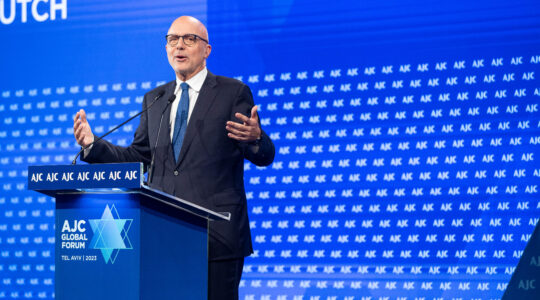(JTA) – In almost any other community from Moscow to Washington, it would have been just another public Chanukah menorah-lighting ceremony providing an opportunity for the local government and Jewish community to showcase their strong ties.
But in Myanmar, where the government has been run by a military junta and the Jewish community numbers just a handful of families, the occasion last week of a public Chanukah lighting ceremony involving government officials was remarkable.
On Dec. 27, the last night of Chanukah, Myanmar’s eight Jewish families were joined by government officials, diplomats and former ambassadors at a Chanukah celebration in Yangon, also known as Rangoon. In all, about 100 people were on hand for the party at the Park Royal Hotel.
Earlier, Jewish community leader Moses Samuels visited the home of Aung San Suu Kyi, the Nobel Peace Prize winner and pro-democracy advocate who until a year ago had been under house arrest for most of the last two decades. At the meeting, Suu Kyi reportedly said that she once had visited the country’s century-old synagogue, Musmeah Yeshua (Hebrew for Instills Hope), which is still open.
Suu Kyi had been invited to the Chanukah event but said she could not attend because it conflicted with a prayer ceremony she was holding at her home for her late mother.
The visits to Suu Kyi and the Yangon Chanukah party were signs of the changes taking place in Myanmar, also known as Burma, where the last year has seen significant economic and political reforms and new openness to the West. Last month, in an affirmation of those changes, U.S. Secretary of State Hillary Clinton visited the country, the first such visit by a U.S. secretary of state in more than half a century.
“The United States is prepared to walk the path of reform with you if you keep moving in the right direction,” Clinton told Myanmar’s president, Thein Sein, during her visit.
Samuels, whose Burmese name is Than Lwin, has been instrumental in keeping alive the Jewish presence in Yangon. Every morning he opens the well-kept blue-and-white synagogue, even though most of the time there is no official prayer service — unless there is a yahrzeit anniversary for the deceased or a visiting Jewish tourist group. Samuels and his son Sammy, who lives in New York, run a tour company in the country called Myanmar Shalom Travel and Tours.
Until this year the community’s Chanukah ceremonies were quiet affairs in the synagogue, according to Samuels. But with Myanmar opening up to the West, the community decided to make the event bigger this year, holding the rite at a hotel and including a photo exhibit of Israel-Burmese relations.
Among the Burmese officials present were Daw Yin Yin Myint, the director general of the Foreign Ministry; U Tin Oo, a former commander in chief of the armed forces who is the vice chairman of the opposition National League for Democracy party; Maung Maung Swe, chair of the Myanmar Travel Association; and U Hein Latt, vice chairman of the newspaper Popular Journal.
Diplomats from the United States, France, Russia, India, Singapore, Britain, Italy and Israel came, and the celebration involved not just Jews but also Christians, Muslims, Buddhists and Baha’i.
Several thousand Jews once lived in Burma. The first known Jew to live in the country was Solomon Gabirol, who served as a commissar to the army of King Alaungpaya, who ruled from 1752 to 1760.
Growing numbers of Jewish merchants came to Burma over the years, and in the mid-19th century a group of Baghdadi Jews led by David Sassoon settled in Burma, India and other lands in the Far East. Burma’s synagogue was built in 1854 and rebuilt in 1896. The community supports a cemetery; its oldest grave is dated 1876.
After the Japanese invasion in 1941, many Burmese Jews fled to India.
Both Burma and Israel achieved independence in 1948, and the two countries enjoyed cordial relations for the first two decades of their existence. That included a warm friendship between prime ministers David Ben-Gurion and U Nu, who was the first head of state to visit Israel. A daughter of U Nu, Than Than Nu, attended last week’s Chanukah party.
When a military junta took over Burma in 1962, installing a repressive regime and nationalizing businesses, most Jews left.
In a recent interview, Israel’s ambassador to Myanmar, Yaron Mayer, told JTA that relations between the two countries had “remained good over the years.” He noted that in 2011 a Myanmar delegation attended an energy conference in Israel.
Some of the few Jews left in Myanmar said they hope that with time and a continual opening of Myanmar’s political system, the Jewish community here will grow.
“No matter what religion we practice or what beliefs we value,” Sammy Samuels said at the Chanukah party, “when we light the candles tonight it reminds all of us to rededicate ourselves to improving the lives of those around us, to spread the light of freedom and to believe that miracles are possible even in times of darkness.”
(Ben G. Frank is the author of the newly published “The Scattered Tribe: Traveling the Diaspora from Cuba to India to Tahiti & Beyond” from Globe Pequot Press.)
JTA has documented Jewish history in real-time for over a century. Keep our journalism strong by joining us in supporting independent, award-winning reporting.





